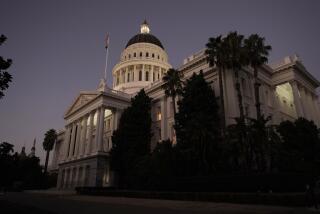House Beats Odds, Rejects Crackdown on Web Gaming
- Share via
WASHINGTON — In a surprising defeat for the commercial casino industry, the House of Representatives on Monday turned back legislation that sought to shut down many new online gambling enterprises--a measure that proponents said would help clean up the “seamy” side of the Internet but that critics called unfair and probably unenforceable.
Although the legislation drew broad bipartisan support, it fell well short of the two-thirds majority needed for passage under special House rules. The 245-159 vote dashed the hopes of key House Republicans who sought to pass a bill similar to one that easily cleared the Senate on a voice vote last fall.
The Clinton administration objected strongly to the House bill, arguing that it would encourage more illegal gambling rather than halt it by giving special treatment to certain online gaming interests.
The vote marked a significant setback for established gambling interests, which had sought to quell the fast-growing competitive threat from as many as 700 cyber-casinos that have sprouted on the Internet in recent years.
The bill--backed by an odd coalition of big Nevada casinos, major sports leagues and some Christian conservatives--took aim at online betting by prohibiting businesses from making or taking wagers on casino-style games of chance and professional and college sports.
Internet service providers would have been required to work with federal and state agents who sought to block or shut down Web sites that break the law. Online bookmakers found in violation of the law would have faced up to four years in prison and a $20,000 fine.
Forty-four Republicans joined 114 Democrats and one independent in voting against the bill. One prominent Republican opponent was Rep. Christopher Cox of Newport Beach, who said the bill would set “a dangerous precedent that invites significant new regulation of the Internet such as we have not yet seen.”
Proponents--who theoretically could try for passage again this year--declared that the measure is urgently needed to corral a fast-growing unregulated area of commerce prone to crime. Rep. Bob Goodlatte (R-Va.), the chief sponsor of HR 3125, called Internet gambling “a major scourge” that reveals a “seamy side” to a technology that has become a driving force in the American economy.
“American families must be protected from the dangers associated with unrestricted and unregulated gambling,” added Rep. Jim Gibbons (R-Nev.), an ally of that state’s multibillion-dollar commercial casino industry. The proliferation of online gambling outlets, Gibbons contended, would enable children to “easily obtain their parents’ credit cards, turn their bedrooms into casinos and . . . squander their parents’ hard-earned money.”
Opponents scoffed at those claims, noting that the law protects credit-card users from unauthorized charges.
With its goal of cracking down on online vice, the bill attracted support from some Christian conservatives and allied groups such as the Family Research Council. But others, such as the Traditional Values Coalition, opposed the bill on the grounds that it did not go far enough.
Other opponents included online sports bookies and government officials in some states who feared a drain on state lottery revenue. The legislation would have restricted the online sale of lottery tickets to those that take place in openly public facilities, effectively barring such transactions in private homes.
The Clinton administration also criticized the House bill for carving out exceptions for online parimutuel betting on horse and dog races and the ball game known as jai alai. Under the bill, certain subscriber-only systems would be allowed to set odds and take online bets on such events. An administration statement contended that the bill would therefore give “children and other vulnerable populations unsupervised, unlimited access to such gambling activities.”
The established casino industry is influential on Capitol Hill and contributes heavily to congressional campaigns and party committees. A report by the Center for Responsive Politics found that gaming interests gave more than $6 million worth of political contributions in the 1997-98 election cycle. The donations do not appear to be slowing down in this presidential election year.
Speaking for the nascent online industry, a group called the Interactive Gaming Council declared on its Web site that the bill failed to set realistic policy for oversight of Internet commerce. The group accepts that its activities could be regulated or even taxed just like those of traditional gaming enterprises.
“The Internet represents freedom, with all the good and bad that freedom can bring,” the council’s chairwoman, Sue Schneider, wrote. “Government efforts to restrict people’s activities on the Internet will either trample on people’s privacy and individual liberty, or else they will be ineffective. In fact, they are only effective to the extent that they are intrusive.”
The council’s Web site lists several member organizations, some of them apparently based outside the United States, that promote online gambling. A link to https://www.betmaker.com, for instance, turned up a site that offers sports fans worldwide wagering opportunities with the convenience of payment via Visa or Mastercard.
“Sports betting and online gambling has never been easier,” the site said. “Now you can bet online or over the phone from the comfort of your own home.” The company asserts that it is “fully regulated and licensed.”
But the American Gaming Assn., which represents the commercial casino and hotel industry, contended that a prohibition on Internet gambling is the only way to guard the integrity of an industry that would otherwise be vulnerable to criminal activity such as money-laundering and racketeering.
“To have any type of legitimate gaming there must be rigorous law enforcement and regulatory oversight,” said Frank A. Fahrenkopf, the group’s president. “And we just at this point in time don’t see that the technology exists to provide that . . . on the Internet.”
More to Read
Sign up for Essential California
The most important California stories and recommendations in your inbox every morning.
You may occasionally receive promotional content from the Los Angeles Times.













